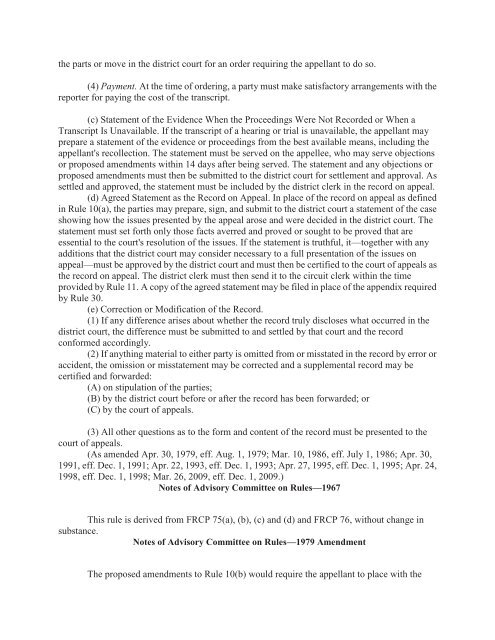Federal Rules of Appellate Procedure 2014-2015, 2014a
Federal Rules of Appellate Procedure 2014-2015, 2014a
Federal Rules of Appellate Procedure 2014-2015, 2014a
Create successful ePaper yourself
Turn your PDF publications into a flip-book with our unique Google optimized e-Paper software.
the parts or move in the district court for an order requiring the appellant to do so.<br />
(4) Payment. At the time <strong>of</strong> ordering, a party must make satisfactory arrangements with the<br />
reporter for paying the cost <strong>of</strong> the transcript.<br />
(c) Statement <strong>of</strong> the Evidence When the Proceedings Were Not Recorded or When a<br />
Transcript Is Unavailable. If the transcript <strong>of</strong> a hearing or trial is unavailable, the appellant may<br />
prepare a statement <strong>of</strong> the evidence or proceedings from the best available means, including the<br />
appellant's recollection. The statement must be served on the appellee, who may serve objections<br />
or proposed amendments within 14 days after being served. The statement and any objections or<br />
proposed amendments must then be submitted to the district court for settlement and approval. As<br />
settled and approved, the statement must be included by the district clerk in the record on appeal.<br />
(d) Agreed Statement as the Record on Appeal. In place <strong>of</strong> the record on appeal as defined<br />
in Rule 10(a), the parties may prepare, sign, and submit to the district court a statement <strong>of</strong> the case<br />
showing how the issues presented by the appeal arose and were decided in the district court. The<br />
statement must set forth only those facts averred and proved or sought to be proved that are<br />
essential to the court's resolution <strong>of</strong> the issues. If the statement is truthful, it—together with any<br />
additions that the district court may consider necessary to a full presentation <strong>of</strong> the issues on<br />
appeal—must be approved by the district court and must then be certified to the court <strong>of</strong> appeals as<br />
the record on appeal. The district clerk must then send it to the circuit clerk within the time<br />
provided by Rule 11. A copy <strong>of</strong> the agreed statement may be filed in place <strong>of</strong> the appendix required<br />
by Rule 30.<br />
(e) Correction or Modification <strong>of</strong> the Record.<br />
(1) If any difference arises about whether the record truly discloses what occurred in the<br />
district court, the difference must be submitted to and settled by that court and the record<br />
conformed accordingly.<br />
(2) If anything material to either party is omitted from or misstated in the record by error or<br />
accident, the omission or misstatement may be corrected and a supplemental record may be<br />
certified and forwarded:<br />
(A) on stipulation <strong>of</strong> the parties;<br />
(B) by the district court before or after the record has been forwarded; or<br />
(C) by the court <strong>of</strong> appeals.<br />
(3) All other questions as to the form and content <strong>of</strong> the record must be presented to the<br />
court <strong>of</strong> appeals.<br />
(As amended Apr. 30, 1979, eff. Aug. 1, 1979; Mar. 10, 1986, eff. July 1, 1986; Apr. 30,<br />
1991, eff. Dec. 1, 1991; Apr. 22, 1993, eff. Dec. 1, 1993; Apr. 27, 1995, eff. Dec. 1, 1995; Apr. 24,<br />
1998, eff. Dec. 1, 1998; Mar. 26, 2009, eff. Dec. 1, 2009.)<br />
Notes <strong>of</strong> Advisory Committee on <strong>Rules</strong>—1967<br />
This rule is derived from FRCP 75(a), (b), (c) and (d) and FRCP 76, without change in<br />
substance.<br />
Notes <strong>of</strong> Advisory Committee on <strong>Rules</strong>—1979 Amendment<br />
The proposed amendments to Rule 10(b) would require the appellant to place with the


















